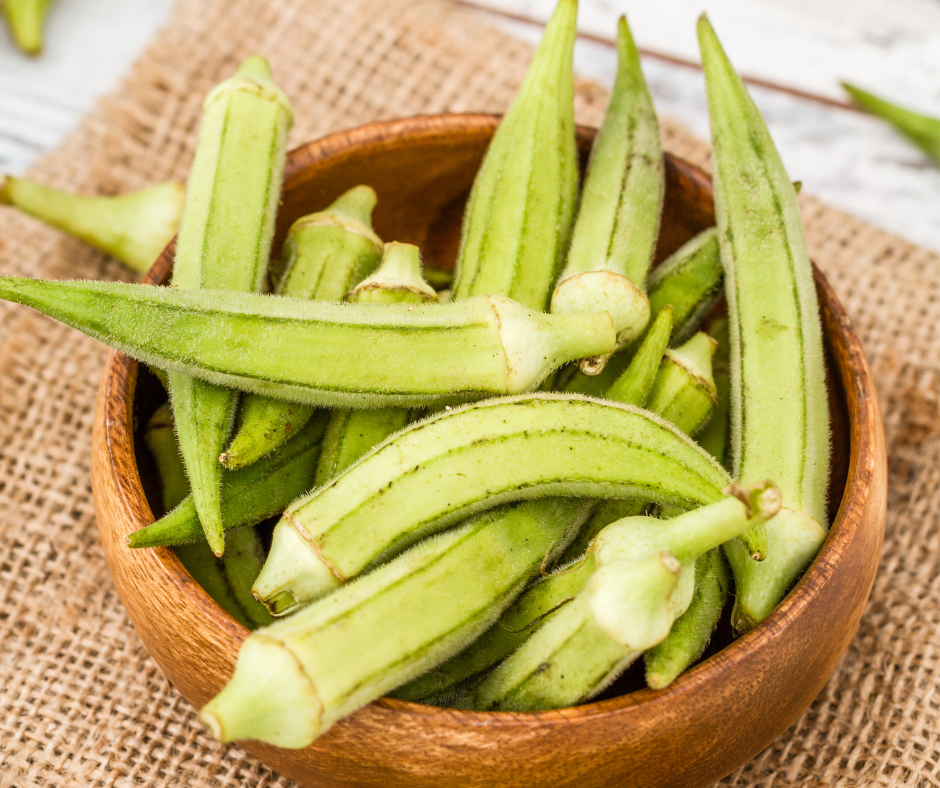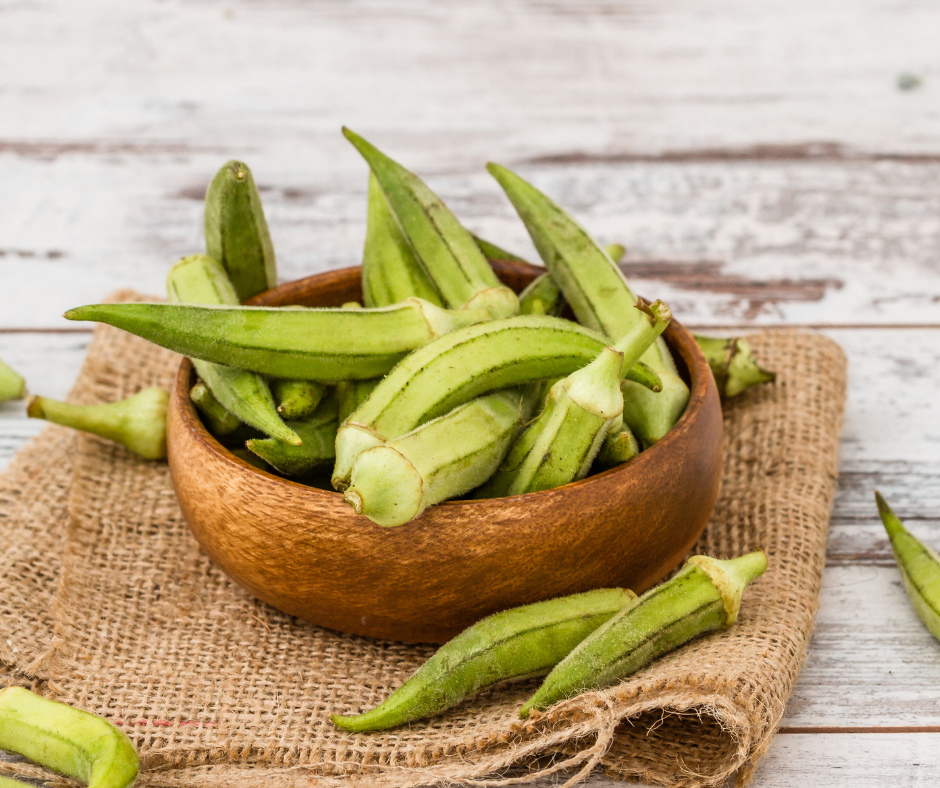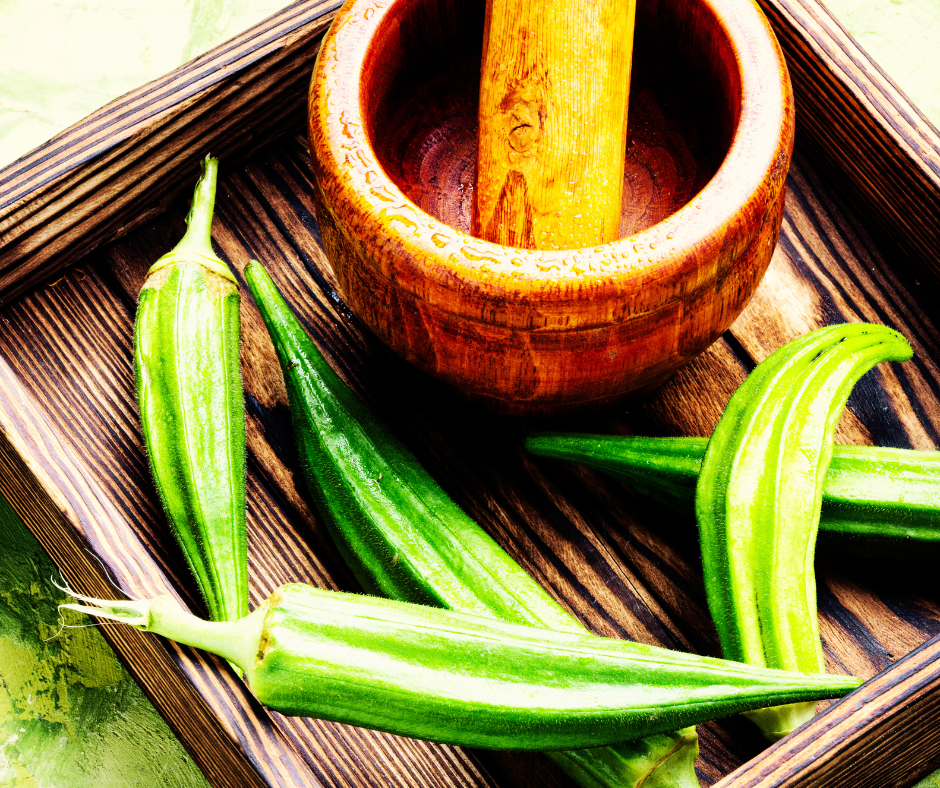Introduction
Raw Okra is a versatile and nutritious vegetable offering various potential health benefits. Whether you enjoy it fresh in salads, pickled, or lightly cooked, raw Okra can be a delicious addition to your diet. However, it’s important to understand the risks and benefits of consuming raw Okra to make an informed decision about its inclusion in your meals. In this article, we will explore what raw Okra is, its nutritional content, and the possible health benefits it may offer to answer ‘Is Raw Okra Safe to Eat?‘.
What Is Raw Okra And Its Nutritional Content?
Raw Okra, scientifically known as Abelomoshcus esculentus, is a green vegetable from the mallow family. It is commonly used in various cuisines worldwide due to its unique texture and mild taste.
Regarding nutritional content, raw Okra is rich in vitamins A and C and antioxidants that help reduce the risk of serious health conditions like cancer and diabetes. It is also a good source of magnesium, folate, fiber, and vitamin K1. Additionally, Okra contains a protein called lectin, which may have inhibitory effects on cancer cell growth in humans.
Possible Health Benefits Of Consuming Raw Okra
Consuming raw Okra has been associated with several potential health benefits:
- Fighting Cancer: Raw Okra contains antioxidants called polyphenols, including vitamins A and C, which help fight off harmful free radicals that can damage cells. These free radicals are known for causing oxidative damage, which can eventually lead to the development of cancer. The lectin in Okra has also been found to inhibit cancer cell growth in humans, further supporting its potential anticancer properties.
- Improving Heart Health: The high fiber content in raw Okra can help lower cholesterol levels, reduce arterial inflammation, and improve overall heart health. Additionally, the antioxidants present in okra help protect against the development of cardiovascular diseases by reducing oxidative stress and inflammation in the body.
- Aiding in Digestion: Raw Okra is rich in dietary fiber, which helps promote healthy digestion and prevent constipation. Consuming fiber-rich foods like Okra can also support the growth of beneficial gut bacteria, improving gut health and overall digestion.
- Boosting Immune Function: The vitamin C content in raw Okra can aid in boosting the immune system, as it helps stimulate the production of white blood cells and antibodies. A strong immune system is vital for fighting off infections and diseases.
- Supporting Weight Management: Raw Okra can contribute to healthy weight management thanks to its high fiber and low-calorie content. Fiber helps promote feelings of fullness, reducing overall calorie intake and preventing overeating.
It’s important to note that while raw Okra offers potential health benefits, individual results may vary. It’s always best to consult with a healthcare professional or registered dietitian before significantly changing your diet.
In conclusion, raw Okra is a nutritious vegetable with various potential health benefits. Its high vitamin and antioxidant content and fiber and lectin content make it a valuable addition to a well-balanced diet. However, it’s essential to be aware of the risks and benefits of raw okra consumption and listen to your body’s needs and preferences.

Risks And Precautions
Potential Risks And Side Effects Of Raw Okra Consumption.
While raw Okra offers numerous health benefits, it is essential to be aware of potential risks and side effects associated with its consumption. Here are some important considerations when determining ‘Is Raw Okra Safe to Eat?’:
- Stomach Problems: Raw Okra contains fructans, a carbohydrate type that can cause bowel problems in individuals with sensitive digestive systems. Some people may experience bloating, gas, or diarrhea after consuming raw Okra. It is advisable to start with small quantities and monitor your body’s reaction to determine if it is well-tolerated.
- Joint Disorders: Okra contains a toxic chemical called solanine, which may exacerbate inflammation and symptoms in individuals with joint disorders such as arthritis. It is recommended that individuals with these conditions consult with their healthcare provider before consuming raw Okra to assess potential risks and benefits.
- Kidney Stones: Raw Okra contains a high amount of oxalates, and calcium oxalate is the primary culprit in the development of kidney stones. Individuals with a history of kidney stones or those at risk of developing them should exercise caution when consuming raw Okra. It is advisable to consult with a healthcare professional for personalized recommendations.
- Allergies: Although rare, some individuals may be allergic to Okra. Allergic reactions can range from mild symptoms like itching or hives to severe reactions such as difficulty breathing or anaphylaxis. If you have a known allergy to Okra or other plants in the mallow family, it is best to avoid consuming raw Okra and seek medical advice.
Precautions For Individuals With Certain Health Conditions.
While raw Okra is generally considered safe for most individuals, there are some precautions to consider if you have certain health conditions:
- Diabetes: Raw Okra contains fiber and antioxidants that can help regulate blood sugar levels. However, individuals with diabetes should monitor their blood sugar levels closely when consuming raw Okra to ensure it fits within their dietary plans. Working with a registered dietitian or healthcare provider is advisable to determine appropriate portion sizes and meal planning.
- Low Blood Pressure: Raw Okra has been found to potentially lower blood pressure due to its antioxidant and fiber content. If you have low blood pressure or are taking medications to lower blood pressure, monitor your blood pressure levels closely and consult your healthcare provider for personalized advice.
- Blood Clotting Disorders: Raw Okra contains vitamin K1, which plays a role in blood clotting. If you have a blood clotting disorder or are taking anticoagulant medications, speak to your healthcare provider about incorporating raw Okra into your diet, as it may affect your medication dosage.
- Gastrointestinal Disorders: Individuals with diverticulitis, Crohn’s disease, or inflammatory bowel disease should exercise caution when consuming raw Okra, as its fiber content may aggravate symptoms. You should consult with a healthcare professional to determine if raw Okra is suitable for your specific condition.
- Pregnancy and Breastfeeding: Pregnant or breastfeeding individuals should consult with their healthcare provider before incorporating raw Okra into their diet. While Okra is generally safe, it is important to consider individual nutritional needs and any potential risks.
It is important to note that individual tolerance and reactions to raw Okra may vary. If you experience any adverse effects or are concerned about incorporating raw Okra into your diet, it is best to consult a healthcare professional for personalized advice.
In conclusion, while raw Okra offers numerous health benefits, including fighting cancer, improving heart health, aiding digestion, boosting immune function, and supporting weight management, it is crucial to consider potential risks and precautions. Some individuals may experience stomach problems, exacerbation of joint disorders, or increased risk of kidney stones. Precautions should also be taken for individuals with conditions such as diabetes, low blood pressure, blood clotting disorders, gastrointestinal disorders, and during pregnancy or breastfeeding. It is always best to consult a healthcare professional to determine if raw Okra suits your specific circumstances and ensure its safe consumption.

Raw Okra Recipes And Preparation Tips
Now that you understand the risks and benefits of consuming raw Okra let’s explore some delicious and healthy recipes using this versatile vegetable. Whether you prefer crunchy or slightly tender, there are plenty of ways to incorporate raw Okra into your diet. Here are a few recipes to try:
Recipe 1: Okra Salad With Lemon Dressing
Ingredients:
– 2 cups of fresh raw Okra, thinly sliced
– 1 red bell pepper, thinly sliced
– 1 small red onion, thinly sliced
– 1 cucumber, diced
– 1 tablespoon of fresh lemon juice
– 2 tablespoons of extra-virgin olive oil
– Salt and pepper to taste.
Instructions:
- Combine the sliced Okra, red bell pepper, red onion, and cucumber in a large bowl.
- Whisk together the lemon juice, olive oil, salt, and pepper in a separate small bowl.
- Pour the dressing over the okra mixture and toss gently to combine.
- Allow the salad to marinate in the refrigerator for at least 30 minutes before serving.
Recipe 2: Okra Smoothie
Ingredients:
– 1 cup of fresh raw Okra, chopped
– 1 banana
– 1 cup of spinach
– 1 cup of almond milk
– 1 tablespoon of honey (optional)
– Ice cubes (optional)
Instructions:
- Combine the chopped Okra, banana, spinach, almond milk, and honey in a blender if desired.
- Blend on high until smooth and creamy.
- Add ice cubes if desired and blend again until well combined.
- Pour the smoothie into a glass and enjoy it as a nutritious breakfast or snack.
Recipe 3: Okra Salsa
Ingredients:
– 1 cup of fresh raw Okra, diced
– 1 tomato, diced
– 1 jalapeno pepper, seeded and minced
– 1/4 cup of red onion, finely chopped
– 1/4 cup of fresh cilantro, chopped
– Juice of 1 lime
– Salt and pepper to taste
Instructions:
- Combine the diced Okra, tomato, jalapeno pepper, red onion, and cilantro in a bowl.
- Squeeze the juice of one lime over the mixture.
- Season with salt and pepper to taste.
- Mix well and let the flavors meld together in the refrigerator for at least 20 minutes before serving.
Tips For Properly Preparing And Enjoying Raw Okra:
- Washing: Before using raw Okra, thoroughly wash it under cold running water to remove dirt or debris. Pat it dry with a kitchen towel or paper towel.
- Slicing: Slice the Okra thinly for salads or thicker for a more substantial texture in smoothies or salsas.
- Pairing flavors: Raw okra pairs well with citrus flavors, such as lemon or lime, tangy dressings, and herbs like cilantro or parsley.
- Adding crunch: If you prefer a crunchy texture, refrigerate the sliced Okra for a few hours before using it in your recipes.
- Experimentation: Don’t be afraid to experiment with different ingredients and flavors to find what you enjoy most. Raw Okra can be combined with various fruits, vegetables, and herbs to create unique and delicious dishes.
Remember, while raw Okra offers numerous health benefits, it is essential to be aware of potential risks and side effects associated with its consumption. If you have any concerns or medical conditions, it is always best to consult a healthcare professional before incorporating raw Okra into your diet.
By exploring these recipes and preparation tips, you can enjoy raw Okra’s crunchiness and unique taste while reaping its nutritional benefits. Whether you try the refreshing okra salad, the creamy okra smoothie, or the tangy okra salsa, savor each bite and listen to your body’s response to ensure your safety and enjoyment.
Remember, raw Okra can be a healthy addition to your diet, but it is always important to consume it in moderation, paying attention to your body’s reactions. Enjoy the journey of incorporating this versatile vegetable into your culinary adventures and reap the rewards of its nutritional value.

Conclusion
Now you should know the answer to ‘Is Raw Okra Safe to Eat?’. Raw Okra can be a healthy and tasty addition to your diet if you understand the risks and benefits associated with its consumption. While raw Okra boasts a range of nutrients and potential health benefits, such as its antioxidant properties and potential cancer-fighting abilities, it is important to be aware of the risks involved.
Is Raw Okra Safe To Eat?
Raw Okra is generally safe to eat, but there are a few considerations to remember. Firstly, Okra contains fructans, a carbohydrate that can cause gastrointestinal problems, particularly in individuals with sensitive stomachs or those prone to digestive issues. If you experience bloating, gas, or abdominal discomfort after consuming raw Okra, limiting your intake may be best, or try cooking it instead. Additionally, some people may be allergic to Okra, so it is important to be mindful of allergic reactions and seek medical advice if necessary.
Balancing The Risks And Benefits Of Raw Okra Consumption.
To balance the risks and benefits of raw okra consumption, it is recommended to moderate your intake and listen to your body’s response. If you are new to consuming raw Okra or have any underlying health conditions, it is always best to consult with a healthcare professional before incorporating it into your diet.
If you enjoy the crunchiness and unique taste of raw Okra, there are several steps you can take to minimize the potential risks. Start by washing the Okra thoroughly under cold running water to remove any dirt or debris, and pat it dry with a kitchen towel or paper towel. Thinly slice the Okra for salads or opt for a thicker texture in smoothies or salsas. Raw okra pairs well with citrus flavors like lemon or lime, tangy dressings, and herbs like cilantro or parsley. If you prefer a crunchy texture, refrigerate the sliced Okra for a few hours before using it in your recipes.
Remember, while raw Okra offers numerous health benefits, paying attention to your body’s reactions and consuming it in moderation is important. If you have any concerns or medical conditions, it is always best to consult a healthcare professional before incorporating raw Okra into your diet.
By understanding the risks and benefits of raw okra consumption and following these preparation tips, you can enjoy this versatile vegetable’s crunchiness and unique taste while reaping its nutritional benefits. Whether you try the refreshing okra salad, the creamy okra smoothie, or the tangy okra salsa, savor each bite and listen to your body’s response to ensure your safety and enjoyment.
In conclusion, raw Okra can be a healthy addition to your diet, but it is always important to consume it in moderation and pay attention to your body’s reactions. Enjoy the journey of incorporating this versatile vegetable into your culinary adventures and reap the rewards of its nutritional value.
FAQ: Is Raw Okra Safe to Eat? Understanding the Risks and Benefits of Raw Okra Consumption
Q: Is Raw Okra Safe to Eat?
A: Yes, it is generally safe to eat raw Okra. However, certain risks and considerations should be taken into account.
Q: What are the potential risks of consuming raw Okra?
A: Raw Okra can be a potential source of foodborne illnesses if contaminated with harmful bacteria or microorganisms. Therefore, it is important to ensure proper washing and sanitation of the Okra before consuming it raw.
Q: How should raw Okra be prepared before consumption?
A: Before eating raw Okra, it is recommended to thoroughly wash it under running water to remove any dirt or debris. Some people also prefer soaking it in vinegar or lemon juice for a few minutes to reduce the risk of bacterial contamination further.
Q: What are the benefits of consuming raw Okra?
A: Raw Okra is rich in nutrients and antioxidants, such as vitamins A and C, contributing to overall health and well-being. These antioxidants help reduce the risk of serious health conditions like cancer, diabetes, and stroke.
Q: Can raw Okra lower the risk of heart disease?
A: Whether eaten raw or cooked, Okra contains beneficial antioxidants that may help lower the risk of heart disease. These antioxidants and other nutrients found in Okra contribute to cardiovascular health.
Q: Are there any specific health conditions to consider when consuming raw Okra?
A: People with diabetes should be cautious when adding more Okra to their diets due to its sugar content. It is advisable to monitor blood sugar levels closely if incorporating raw Okra into a diabetic meal plan.
Q: Should I consult a healthcare professional before consuming raw Okra?
A: It is always prudent to consult with a healthcare professional or a registered dietitian before making any significant changes to your diet. They can provide personalized advice based on your health status and dietary needs.
Remember, while the information provided here is based on online data, it is crucial to seek professional medical advice for individual concerns and to ensure the safety and suitability of raw okra consumption in your specific circumstances.
Graham Bartlett, owner at Taco and Piña Mexican food, is all about bringing the authentic flavors of Mexico to your plate. With Graham Bartlett, you can tantalize your taste buds with mouthwatering tacos and delicious piña coladas, all in one place. Stay connected and never miss a beat as Graham Bartlett takes you on a culinary journey through vibrant Mexican cuisine. Join the community and discover the perfect blend of flavor, culture, and passion that Graham Bartlett brings to the table. Experience the essence of Mexico, one bite at a time, with Graham Bartlett.
